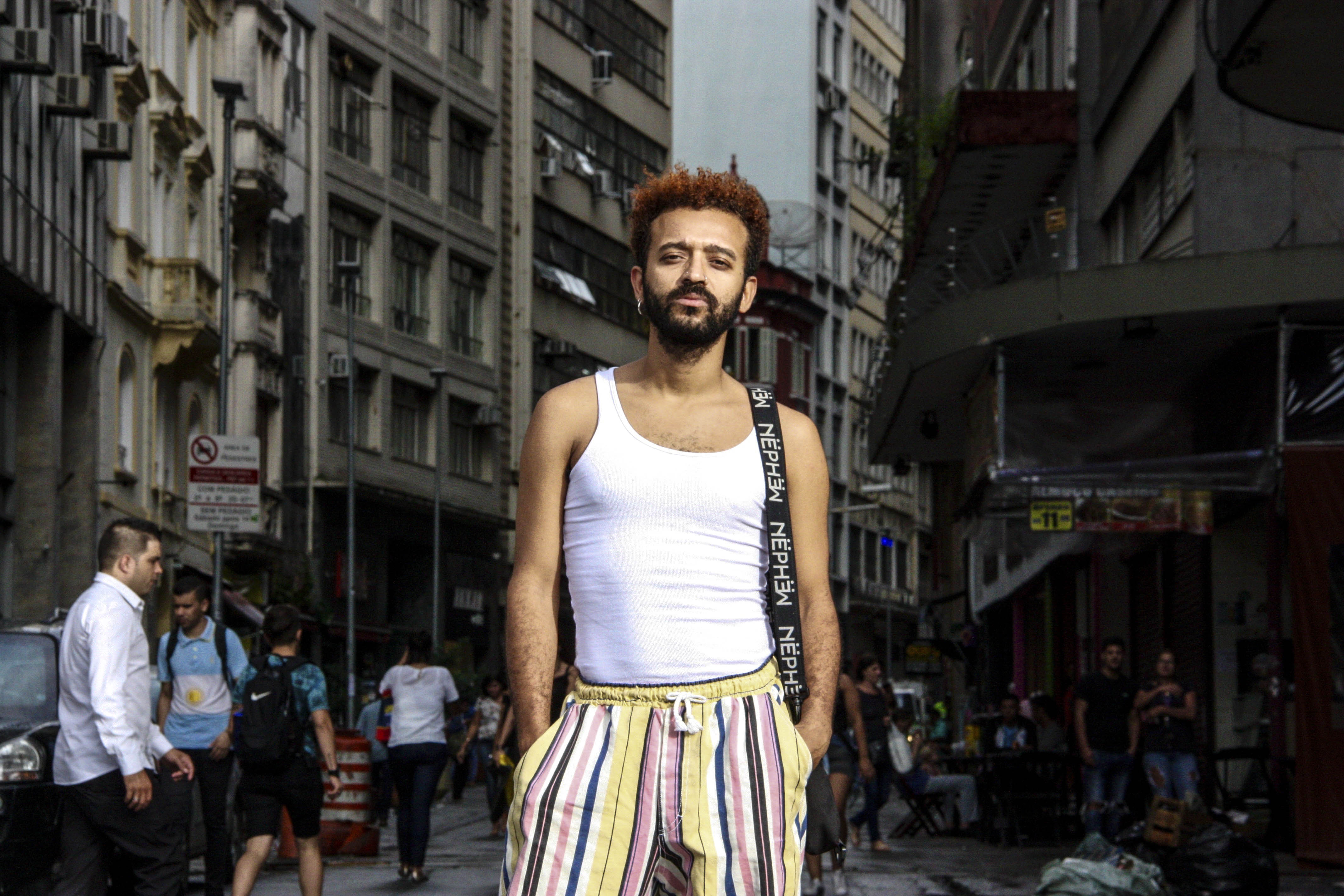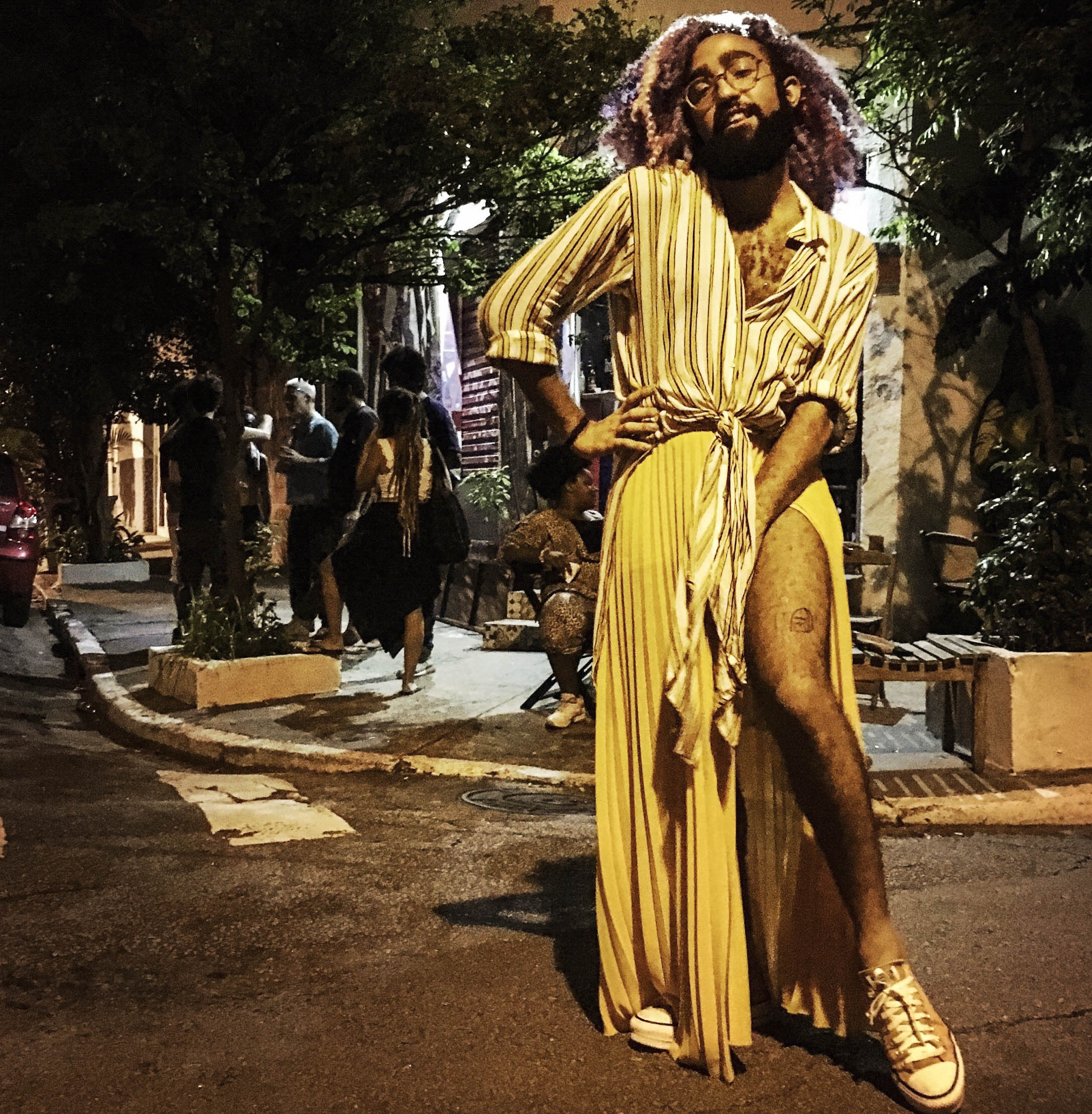Alternatives: Founders Maurício Sacramento (left) and Wesley Miranda shaped the Batekoo movement from a single birthday party, when they planned to host a black party, with black DJs in Salvador. (Felipe Gabriel)
It was something of a political act, having braids put in his hair. After years of “people trying to put me in a white space because of my light skin”, Eliabe de Freitas had come to terms with the beauty of his blackness and wanted to show this to the world.

Eliabe de Freitas says he finds the events, which attract queer, black, poor and body-diverse people, empowering. (Carl Collison/ M&G)
Reclining lazily on a couch in a basement lounge in central São Paulo, dotted with hip young things of all hues — black Goths in top hats and sweeping black coats, hip-hop heads and skater boys and girls — the 31-year-old explains: “Here in Brazil it’s really crazy, because having braids is like accepting your heritage and who you are. For me, when growing up, I would never let my hair get bigger, because my mom would always say it was not good, it was not nice, it was not well-accepted somehow. So I always had my hair shaved. When I had those braids put in, I was really feeling myself. It was like the world couldn’t stop me. And then this party came the very next day. So I was feeling really, really empowered.”
The party he speaks of was one thrown under the banner of Batekoo, the unapologetically pro-queer, pro-black, pro-poor, pro-body diversity series of monthly events held in São Paulo and other cities across Brazil.
Recalling his first such party, De Freitas remembers entering the cavernous, cramped club in São Paulo’s city centre — blasting hip-hop, R&B and, of course, Brazilian funk tracks — and being “shocked” at what he saw: the city’s marginalised young (queer folk, black folk, poor folk, fat girls, fat boys and all manner of in-betweeners) all “shaking their asses like crazy”.
“We got there and I was completely surprised,” he recalls. “Some people half-naked, all sweating. It was like the roof was on fire and everybody dripping in sweat and dancing like crazy. I was never in an environment where I saw so many black people together, celebrating, partying, being free and being very happy with their own selves. It was a really good surprise. I felt like, really myself, right? On the dance floor, I was throwing my braids up and down,” he laughs. “It was really, really crazy. For me, it felt like a milestone.”
A popular gathering
A few days before my chat with De Freitas, on the last day of this year’s annual Carnaval Rio de Janeiro festivities, a queer bloco (or block party) was being held in Rio’s city centre and the freaks were out in full force: swigging on cheap beer, caipirinhas and toking on joints or suggestively sucking on lollipops, they pranced and posed, wiggling their asses teasingly as Brazilian funk beats bounced their way off the high-rise buildings and back down to the streets, where thousands of queer folk clapped their hands, shook their tushes and sang in appreciative, heady unison to much-loved tracks.
Impressive as this thousands-strong queer gathering was, back in São Paulo, two weeks before, thousands more — approximately 50 000, in fact — converged for a bloco put together by the Batekoo collective.
After their most successful bloco to date, the organisers are looking decidedly relaxed. The scale of the event’s success has, however, yet to sink in.
“We’ve had big editions before, but this year was crazy. Really crazy,” Artur Santoro, one of the organisers of São Paulo’s Batekoo events, laughs incredulously. Dressed in a bright yellow, ankle-length skirt (its long slit revealing hairy legs), striped blouse (strategically unbuttoned to show off his hairy chest) and topped off by his signature look — a bold bush of blue and purple hair extensions — the bearded 22-year-old cuts a striking figure.

Pro-party: Brazil’s Batekoo events are a voice for the marginalised. Organiser Artur Santoro just pulled off a record-breaking party for 50 000 attendees in São Paulo. (Carl Collison/ M&G)
Sitting on the pavement of a bar in the city’s bohemian neighbourhood of Santa Cecília, Santoro is a magnet for attention. One passer-by shouts: “I love your hair.” Not missing a beat, his colleague, Wesley Miranda, hits back derisively: “It’s a wig. Plastic!”
Their free-flowing, back-and-forth quips and bitchy banter belie the seriousness with which they take their parties-with-a-cause.
Their own world
“Batekoo is a statement by the black LGBTQ [lesbian, gay, bisexual, transgender and queer] community,” says Santoro. “And that statement is we must be respected, we must be listened to. That black LGBTQ lives matter. And that if the world doesn’t want to accept us, we will create our own world.”
Miranda helped to create Batekoo and this alternative world, somewhat by accident, it would seem. In 2014, in the city of Salvador, Miranda decided to throw a birthday party. He approached his friend and Batekoo cofounder Maurício Sacramento to help him put it together. From the onset, he says, the pair “wanted it to be a black party, with black DJs”.
“This is because we are from Salvador, the blackest city in the world outside of Africa. But the majority of parties there are put together by white people, even though they play mostly black music,” he says.
In August 2015, the parties kicked off in São Paulo. But, he laughs, “the first one we had was in a very bad place. I didn’t know the city, so it was in a very wrong neighbourhood. Basically, the poshest, whitest neighbourhood in São Paulo. Where straight, rich people go to party. People who came to that party complained a little bit. They didn’t understand why we had it there”.
The lessons learnt since have paid off. Not only do they put together monthly events in major cities across Brazil, but they have also been confirmed as part of the line-up of this year’s Afropunk festival in Brooklyn, New York City.
Says Miranda: “We always thought of Batekoo as just a monthly party. But actually we realised it’s bigger than that. It’s like a movement. We try to — and I think we do — create a safe space, mainly for black LGBTQ people and women to dance and express their identities and bodies. We have a lot of trans people who work with us and they see themselves represented. Today, this is our motto. To think about all these people represented with our movement and our parties.”
Despite partnering with “a lot of brands, like Budweiser, Nike, Adidas” and media coverage including a feature in Vogue magazine, the intersectional movement has faced some backlash from, some would say, an unlikely quarter.
“Batekoo suffered a lot of racist attacks and it always only came from the white LGBTQ community, especially white gay guys,” says Miranda. “They were horrible, saying things like we are monkeys, we stink and things about our hair.”
Juliana Andrade has lived most of her life under this judgmental gaze.
“White people would always talk about my body and the way I dance. So I eventually stopped going to [white] places,” says the 24-year-old. Her first venture into the accepting world of Batekoo gatherings left her “shocked in a good way”.
“After a long time of not feeling comfortable with yourself and then, when you get to a place and nobody stops you from being yourself, it is really frightening somehow. Really shocking,” she laughs.
Dressed in leopard-print jumpsuit and black crop-top, Andrade recalls how her second Batekoo party was a night of firsts.
“It was the first time I ever wore a crop-top. The first time I wore shorts as well. And it was also my first twerking competition, which I won. That was my first victory.”
Andrade is now a regular winner of twerking competitions. Santoro laughs: “When Juju enters twerking competitions, people are like, ‘Stop! Stop competing. Let somebody else win, for a change.’ ”
“So you see,” Andrade continues, “Batekoo gave me autonomy. A safe space in which to understand my body. It is everything to me.”
For that reason, the pushback from those in the white queer community does little to dissuade her.
“For me, it’s just reaffirming that [what] we are doing is really important. Because these attacks used to happen a lot and no one used to say anything. But now I have a voice within this movement to say: ‘Look, we are doing something right. Now we can fight back somehow.’ ”
The poor people’s party
Affording people the opportunity to fight back does, however, come at a cost — especially when deliberately wanting to open your doors to the economically disadvantaged.
“Not only our entrance fee, but also prices at the bar are very low,” says Santoro. “When you think of black people, you have to think of all the dynamics around being black. And money is always a question for us. It is very difficult to keep it as a cheap party. We are always racking our brains, trying to make the books balance. It is hard, because our public is a poor public. They can’t afford expensive things, so we have to keep prices low and just hope. So it is always a risk we are taking, you know?”
But the risks are worth it because, he adds, “before Batekoo, there weren’t any parties focusing on black, queer people. Maybe people didn’t know that they needed it, but when Batekoo was created, everybody was like, ‘Wow, that’s it.’ ”
De Freitas was one such person.
Back in the basement lounge, readying himself for a night on the town, he checks his reflection in the bathroom mirror. Though the braids are now long gone, their symbolic significance is still with him. And so is his allegiance to the Batekoo movement.
“It’s very important for any person to understand that they have a place, a space. And that they have people who see them as attractive and interesting. So Batekoo is actually very political in a sense.
“You see, in Brazil, we live in a society where everyone says: ‘We’re not racist; we don’t act with prejudice.’ But it’s a lie. As queer black people, we feel it in our daily lives. So … [it’s fantastic] having this space that tells you that that is really okay, and that you’re beautiful the way you are. And you can see that people really see that beauty in you. It’s very empowering. And so necessary.”
Carl Collison is the Other Foundation’s Rainbow Fellow at the Mail & Guardian
